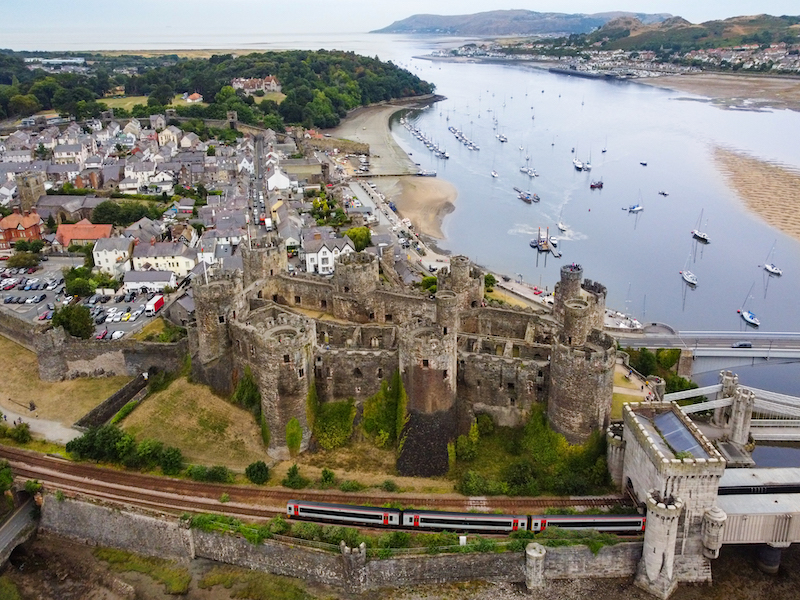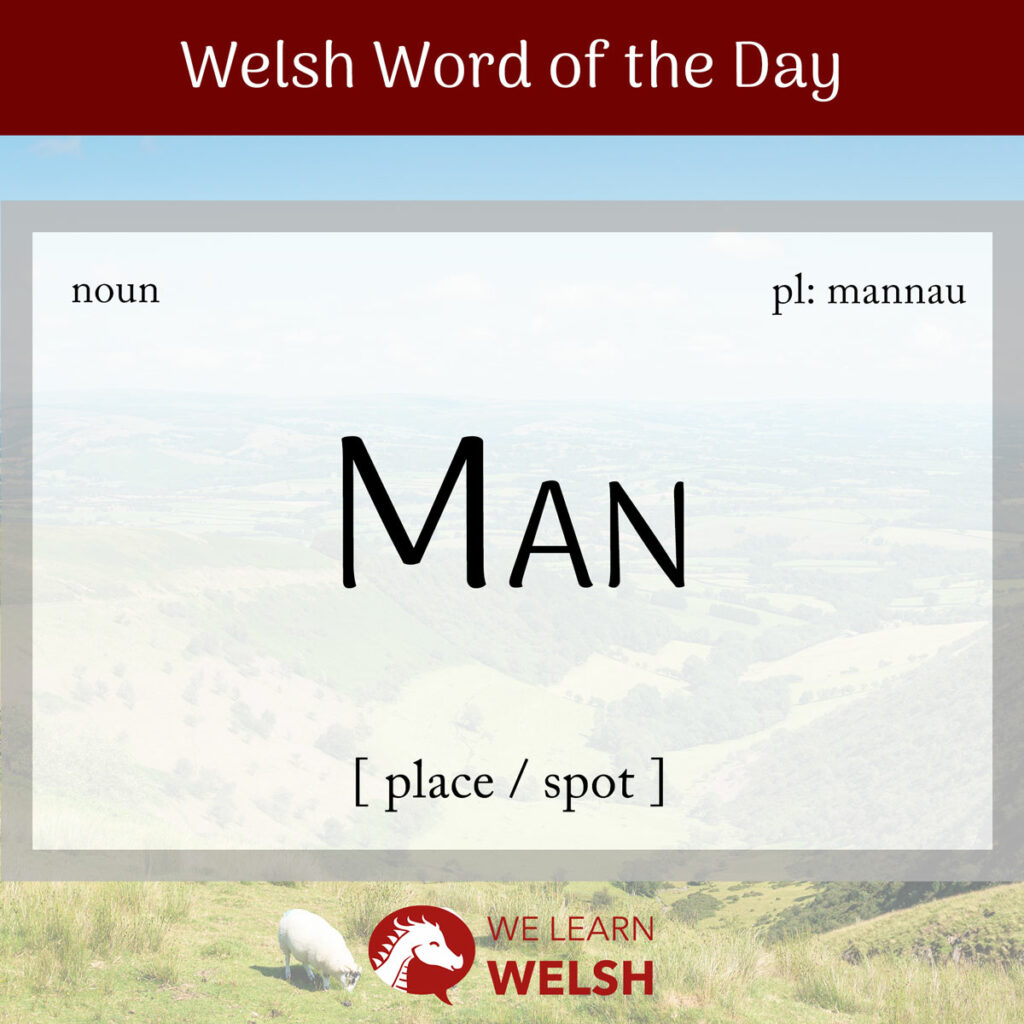Today’s Welsh Word of the Day is man, which means place or spot. You might have seen this word pop up in place names such as Manafon (lit. river place) in Powys and Man-moel (lit. bare place) in Caerphilly.
Man is an unusual word because it does not have a set grammatical gender; you can choose whether to treat it as masculine or feminine. Often, words with this quality are loan-words from other languages that lack an agreed gender e.g. gôl (goal), locomotif (locomotive). However, man is a very common and old Welsh word, originating from the Middle Welsh mann.
man
place
Man (plural: mannau) is only susceptible to the soft mutation:
Soft mutation
fan
Nasal mutation
N/A
Aspirate mutation
N/A
Welsh has a second word for place: lle. As a result, Welsh has two words for nowhere:
- yn unman / ‘nunman
- yn unlle / ‘nunlle
…and two words for everywhere:
- pobman
- poble
…but, interestingly, only one word for somewhere: rhywle. There’s no equivalent of rhywle that uses man.
Both words for place appear in the Welsh phrase yn y fan a’r lle or yn y man a’r lle which mean on the spot or immediately (literally “in the place and the place”).
Man appears as part of many Welsh words:
- canolfan = centre (lit. middle place)
- cylchfan = traffic roundabout (lit. circle place)
- croesfan = crossing (lit. cross place)
- gwefan = website (lit. web place)
When used as a suffix, man is usually mutated to fan, as you can see above. The shortened version, fa, is also very widely used in the language. For instance, you might go to a swyddfa (office), walk through the mynedfa (entrance) and talk to someone at the derbynfa (reception) before leaving through the allanfa (exit). If you were feeling ill, you might pay a visit to a meddygfa (doctor’s surgery) or a fferyllfa (pharmacy).
Prynais i’r car yn y fan a’r lle.
I bought the car on the spot.

Here are some other Welsh words that use the -fa suffix:
- lolfa = lounge, sitting room (from lolian, to talk nonsense)
- campfa = gym (lit. achievement/feat place)
- camfa = stile (lit. step place)
- porfa = pasture (from pori, to graze)
- drysfa = maze (from drysu, to confuse)
- Y Wladfa = Patagonia (lit. The Colony, the country place)
Not all of the words that end in fa refer to places, for instance:
- gyrfa = career (from gyrru, to drive)
- lladdfa = carnage (from lladd, kill)
- cerddorfa = orchestra (from cerddor, musician)
- geirfa = vocabulary (from gair, word)
- golygfa = view (from golwg, sight)
- sefyllfa = situation (from sefyll, to stand)
To find the plural version of any word ending in -fa, replace -fa with -feydd. For instance, the plural of allanfa is allanfeydd. Another useful tip to bear in mind is that words ending in -fa are nearly always feminine – that’s why we say swyddfa bost instead of swyddfa post.
One particularly important Welsh word deriving from man is cronfa (reservoir), which comes from the word cronni which means to gather or to hold back. Water (dŵr) is one of Wales’ greatest natural resources, and has played an important and sometimes painful role in its history. Perhaps the most famous example of this is the 1965 Tryweryn flooding (Boddi Tryweryn), which turned the Welsh village of Capel Celyn into a reservoir in order to provide water to Liverpool and Wirral. 48 out of the 67 residents lost their homes and 800 acres of land were flooded, destroying the local swyddfa bost (post office), ysgol (school), capel (chapel) and mynwent (graveyard).
Ble mae’r man cyfarfod?
Where’s the meeting place?
This incident is seen by many as an example of English oppression, especially due to the fact that Capel Celyn was one of the last exclusively Welsh-speaking communities in the area. This is not the only such community that has been destroyed over the years; for instance, the Welsh community of Mynydd Epynt was displaced so that their homes and land could be used for military training. Cofiwch Dryweryn (Remember Tryweryn) and Cofiwch Epynt (Remember Epynt) have become rallying cries for Welsh nationalists, who believe that Welsh political autonomy is a necessary defence against the exploitation of Welsh people and resources.
It seems to me that because of lost communities such as Capel Celyn and Mynydd Epynt, Welsh people have a unique relationship with mannau (places). For many people, the Welsh landscape still carries the scars of a battle for self-determination, with homes drowned or blown up in the name of the greater good. Perhaps this is why hiraeth (longing, homesickness) is such a well-known Welsh word; homesickness takes on a new meaning when your home no longer exists.

